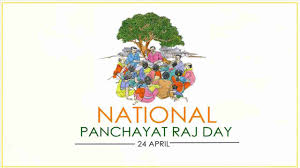Table of Contents
Daily Current Affairs for Government Exams:
Today Current Affairs:24th April 2020 for UPSC IAS exams, State PSC exams, SSC CGL, State SSC, RRB, Railways, Banking Exam & IBPS, etc
Contents:
- International Day of Multilateralism and Diplomacy for Peace
- Operation Twist
- 90 years for Peshawar’s Qissa Khwani Bazaar massacre
- Parliamentary Committee On Industrial Relations Code Bill, 2019:
- NanoBlitz 3D
- Sugarcane under the Concurrent List of the Constitution.:
- World Bank’s April 2020 Commodity Markets Outlook:
- National Panchayati Raj Day
- Tianwen 1: China’s first Mars Exploration Mission:
- Other important current affairs.
1. International Day of Multilateralism and Diplomacy for Peace :

On April 24, 2020, the second official International Day of Multilateralism and Diplomacy for Peace is being celebrated.
- Date of international observance: 24 April of every year.
- International Day was officially approved on 12 December 2018 by United Nations General Assembly through a resolution.
- Objective: To disseminate the advantages of multilateralism and diplomacy for peace through educational and public awareness-raising activities.
2. Operation Twist:

The Reserve Bank Of India (RBI) has decided to conduct simultaneous purchase and sale of government securities under Open Market Operations (OMO) for ₹10,000 crores each on April 27, 2020, considering the current and evolving liquidity and market conditions.
- Such Open Market Operations are known as ‘Operation Twist,’ which was used by the RBI in December 2019 for the first time.
- Operation Twist is the RBI’s simultaneous selling of short-term securities and buying of long term securities through Open Market Operations (OMO) in order to bring down long-term interest rates and bolster short-term rates.
- Operation Twist was first used in 1961 by the US Federal Reserve (central bank) as a way to strengthen the U.S. dollar and stimulate cash flow into the economy.
- Under this mechanism, the short-term securities are transitioned into long-term securities.
Impact of Operation Twist:
- As the central bank buys long-term securities (bonds), their demand rises which in turn pushes up their prices.
- However, the bond yield comes down with an increase in prices (inverse relationship).
- Yield is the return an investor gets on his (bond) holding/investment.
- The interest rate in an economy is determined by yield. If the yield is low, interest rates decrease.
- Thus, lower long-term interest rates mean people can avail of long-term loans (such as buying houses, cars, or financing projects) at lower rates.
- This will lead to a boost in consumption and spending in the economy which in turn will revive the growth.
3. 90 years for Peshawar’s Qissa Khwani Bazaar massacre.:

The massacre was perpetrated by British soldiers against non-violent protesters of the Khudai Khidmatgar movement on April 23, 1930.
- The Khudai Khidmatgar was a non-violent movement against the British occupation of the Indian subcontinent.
- It was led by Abdul Ghaffar Khan, a Pashtun freedom fighter, in the North-West Frontier Province.
- Over time, the movement acquired a more political color, leading to the British taking notice of its growing prominence in the region.
- Following the arrest of Khan and other leaders in 1929, the movement formally joined the Indian National Congress after they failed to receive support from the All-India Muslim League.
- Members of the Khudai Khidmatgar were organized and the men stood out because of the bright red shirts they wore as uniforms, while the women wore black garments.
Qissa Khwani Bazaar massacre:
- Abdul Ghaffar Khan and other leaders of the Khudai Khidmatgar were arrested on April 23, 1930, by British police after he gave a speech at a gathering in the town of Utmanzai in the North-West Frontier Province.
- Khan’s arrest spurred protests in neighboring towns, including Peshawar.
- Protests spilled into the Qissa Khwani Bazaar in Peshawar on the day of Khan’s arrest.
- British soldiers entered the market area to disperse crowds that had refused to leave. In response, British army vehicles drove into the crowds, killing several protesters and bystanders.
4.Parliamentary Committee On Industrial Relations Code Bill, 2019:

Recently, the Parliamentary Committee on Labour submitted its report on the Industrial Relations Code, 2019.
- The Industrial Relations Code 2019 (IR Code) is the third bill in a series of four being framed to amalgamate and rationalize more than 40 central laws governing labor affairs.
- Two other bills were :
- (a) Code on Wages, 2019, and
- (b) Occupational Safety, Health and Working Conditions Code, 2019.
- The Committee in its report said that in case of natural calamities, payment of wages to the workers until the re-establishment of the industry may be unjustifiable.
- The idea behind the recommendations is that the industry should not be forced when the situation is beyond their control.
- The law has to be reasonable, in such cases, it is for the government to step in and extend a helping hand for the industries.
- According to the Committee, Covid-19 would be counted as natural calamity.
- The Industrial Code makes it incumbent upon the employer to pay 50% wages to the workers/employees who are laid off due to a shortage of power, coal, raw material, etc. for 45 days.
- The Industrial Relations Code, 2019 was introduced in the Lok Sabha and referred to the Standing Committee on Labour in December 2019.
- With the ongoing lockdown, the draft report was circulated to the members via email on April 15, and later the final adopted report was accepted by the Speaker.
Industrial Relations Code Bill, 2019
- The Industrial Relations Code, 2019 was introduced in Lok Sabha. It seeks to replace three labor laws:
- The Industrial Disputes Act, 1947
- The Trade Unions Act, 1926
- The Industrial Employment (Standing Orders) Act, 1946.
5.NanoBlitz 3D.:

Scientists from the International Advanced Research Centre for Powder Metallurgy and New Materials (ARCI) an autonomous institute under the Department of Science &Technology, has developed NanoBlitz 3D.
- NanoBlitz 3D is an advanced tool for mapping nano-mechanical properties of materials like multi-phase alloys, composites, and multi-layered coatings.
- It enables the performance of a large array, typically consisting of 1000s high-speed nano-indentation tests, wherein each indentation tests takes less than one second to measure hardness and elastic modulus of a given material.
- The high-speed mapping capabilities of the tool can also be used to quickly establish structure-property linkages at a micrometer length scale or higher, which can help to understand multiscale mechanics and aid in the development of hierarchical materials.
- This, in turn, expedites the development of high-performance novel materials under an Integrated Computational Material Engineering (ICME) approach.
6.Sugarcane under the Concurrent List of the Constitution.:

A Constitution Bench of the Supreme Court held that both the Central and State governments have the power to fix the price of sugarcane under the Concurrent List of the Constitution.
- However, the Bench said that even though a State cannot fix a “minimum price” if the Centre has already fixed it, the State is always welcome to fix the “advised price”.
- The advised or remunerative price shall be higher than the minimum price in accordance with the provisions of the Sugarcane (Control) Order, 1966, issued under Section 16 of the Uttar Pradesh Sugarcane (Regulation of Supply and Purchase) Act, 1953.
- The case revolved around a petition by the Western Uttar Pradesh Sugar Mills Association questioning if the State had the power to fix a minimum price when a similar price had already been set by Central legislation.
8. World Bank’s April 2020 Commodity Markets Outlook:

According to the World Bank’s April 2020 Commodity Markets Outlook, Covid-19 is expected to bring most commodity prices down substantially in 2020.
- However, it also says that the outlooks are “exceptionally uncertain” and depend on the severity and duration of the pandemic and when mitigation measures are taken.
Key Points
- Worst Hit
- Energy and metals commodities are the most affected by the sudden stop to economic activity and the serious global slowdown that is anticipated.
- Commodities associated with transportation, including oil, have experienced the steepest declines.
- Agricultural prices are likely to stay broadly stable in 2020 because of relatively stable demand and all-time high levels of staple production and stock.
- However, supply chain disruptions and government steps to restrict exports or stockpile commodities raise concerns that food security may be at risk in places.
- Gold prices were up 6.9% in the last quarter (January- March 2020) – its sixth consecutive quarterly rise.
The strong investor demand propped gold up despite weak jewelry demand in India and China.
- Oil Prices:
- These are expected to average at $35 per barrel in 2020.
- The decline in crude oil prices has been exacerbated by uncertainty around production agreements among the Organization of the Petroleum Exporting Countries (OPEC) and other oil producers.
- Impact on Importers and Exporters:
- They are likely to see some long-term shifts in their markets due to the pandemic.
- These include:
- Increasing transport costs due to enhanced border checks and thus impact on supply chains.
- Substituting for imports with domestic goods: Companies might prefer to source from closer by for instance.
- Other Observations:
- Changing consumer behavior, for instance, people may choose to work remotely, travel less, and this could impact permanent drops in demand for oil, favorably impacting the accounts for oil importers.
- The reduction in emissions of the harmful gases caused by the restrictions may also increase public pressure for greener transport and lowered fossil fuel use.
Commodity Markets Outlook
- It provides market analysis for major commodity groups – energy, metals, agriculture, precious metals, and fertilizers.
- The report forecasts prices for 46 key commodities, including oil.
- It is published by the World Bank in April and October.
8.National Panchayati Raj Day:

Every year, the Indian Government celebrates April 24 as National Panchayati Raj Day. The day is also called National Local Self Government Day. The 73rd Constitutional Amendment came into effect on April 24. The amendment gave constitutional status to the Panchayati Raj System.
- The National Panchayati Raj Day was first declared by PM Modi in 2010. The day is being marked every year by the Ministry of Panchayati Raj.
- In the year 2020, on the eve of National Panchayati Raj Day, PM Modi launched the E-Gram Swaraj application and portal.
- Also, he launched the Swamitva scheme to integrate lands and reduce land disputes. The scheme was launched in 6 states.
- The portal and application were launched to develop the villages in the country.
- Also, the Ministry of Panchayati Raj presented the following awards for the best performing Panchayats
E-Panchayat Puraskar
- Nanaji Deshmukh Rashtriya Gaurav Gram Sabha Puraskar
- Gram Panchayat Development Plan Award
- Deen Dayal Upadhyay Panchayat Sashaktikaran Puraskar
- Child-friendly Gram Panchayat Award.
10.Tianwen 1: China’s first Mars Exploration Mission:

The Chinese National Space Administration (CNSA) named its first Mars Exploration mission as Tianwen 1. The CNSA also announced that henceforth all the planetary missions are to be named as the Tianwen series.
- The announcement comes on April 24 as China has been celebrating its National Space Day on April 24 since 2016.
- China celebrates its Space Day to mark the launch of its first satellite Dongfanghong-1.
- Tianwen means Heavenly Questions.
- The Chinese Mars mission includes orbiting, landing, and roving on the planet Mars.
- Earlier in 2011, China attempted to send its exploratory probe called Yinghuo-I in a Russian spacecraft. However, the spacecraft was declared lost after it burnt during its re-entry.
Other important current affairs:
1. The Finance Ministry has frozen the Dearness Allowance (DA) increases for the central government staff and Dearness Relief (DR) increases for pensioners for the period between January 2020 and July 2021.
- The move will impact 48 lakh central government employees and 65 lakh pensioners.
- However, DA and DR at current rates will continue to be paid to the employees and pensioners.
- The 4% DA hike for central government employees announced in March 2020 . was effective from January 1, 2020.
- Since states generally follow the central government on DA and DR decisions, it is expected that states may announce similar decisions.
- The savings on account of freezing of increase in DA and DR to central government employees and pensioners would be Rs 37,530 crore in the current financial year and 2021-22.
- This would create room for stepping up expenditure on health and welfare measures amid the Covid-19 pandemic.
- Also, the government finances have been strained due to a decline in tax and non-tax revenues.
- If states follow the Centre, the estimated savings will be Rs 82,566 crore.
2.Social media giant Facebook has picked up a 9.99 % stake in Reliance Industries’ Jio Platforms at Rs 43,574 crore ($5.7 billion) making it the largest FDI for a minority investment in India. Jio Platforms is a wholly-owned subsidiary of Reliance Industries Limited that works on digital apps, digital ecosystems, and mobile service.
- The investment by Facebook put the value of Jio Platforms at Rs 4.62 lakh crore pre-money enterprise value — that is $65.95 billion at a conversion rate of Rs 70 to a Dollar.
- The first collaboration will happen around the Jio Mart.
3. The Krishi Kalyan Abhiyan (KKA) is being implemented in 112 Aspirational districts of the country.
- Krishi Kalyan Abhiyan: Launched in 2018 under the Ministry of Agriculture and Farmers’ Welfare.
- Aim: to aid, assist, and advise farmers to improve their farming techniques and increase their incomes.
- Krishi Kalyan Abhiyaan will be undertaken in 25 Villages with more than 1000 populations each in Aspirational Districts identified in consultation with the Ministry of Rural Development as per directions of NITI Ayog.
- In districts where a number of villages (with more than 1000 population) is less than 25, all villages will be covered.
- The overall coordination and implementation in the 25 villages of a district is being done by Krishi Vigyan Kendra of that district.
4. National Innovation Foundation-India (NIF) boosts new varieties of Anthurium, a flower with high market value, by lady innovator from Kerala.
- Anthurium (Anthurium spp.) is a vast group of beautiful blooming plants available in a wide range of colors.
- Salient features of the Anthurium varieties are Large beautiful flowers; Different colors of spathe and spadix; Long stalks; Better shelf life and Good market value.
- They are beautiful but also purify the surrounding air and remove harmful airborne chemicals like formaldehyde, ammonia, toluene, xylene, and allergens.
- Due to Its importance of removing toxic substances from the air, NASA has placed it in the list of air purifier plants.
5. The Central government has allowed the conversion of surplus rice to ethanol.
- Ethanol produced from this will be used for utilization in making alcohol-based hand sanitizers and blending in petrol.
- Ethanol is one of the most variable alternatives amongst biofuels.
- The National Biofuel Coordination Committee (NBCC) took the decision which will lead to utilization of part of a huge stockpile of 30.57 million tonnes (MT) of rice which is almost 128% more than the buffer stock and strategic requirement norms.
- At present, the Food Corporation of India (FCI) has huge rice stock from previous years excluding the unmilled paddy lying with millers on behalf of FCI.
- Using surplus rice for ethanol will address the concern of about 750 million liters of grain-based distillery capacities lying idle, due to the lack of feedstock.
6. PM Narendra Modi launched the E-Gram Swaraj application and 2 portals to accelerate the pace of development in villages.
- The application will help panchayats to complete development projects in villages.
- It will accelerate project in villages starting from planning to completion.
- The Swamitva Yojana will use drones to map properties in villages.
- This will help to reduce disputes over property.
- The portals will help the villagers to obtain their loans easily from banks.
6.The prevailing lockdown has impacted the harvest and sale of Jagtial mangoes.
- The ‘Benishan’ or Banganapalli variety of Mangoes is widely grown in the Jagtial district of Telangana.
- Marketed as “Jagtial mango – Telangana” in Delhi, Chandigarh, Ahmedabad, Kolkata, Lucknow, Gwalior, and Srinagar, the mangoes are popular for their quality, taste and long shelf-life. and hence are more in demand in the export market,
- The Jagtial mangoes arrive late into the market after the first week of April, have less water content, and more shelf-life and hence are more in demand in the export market.
7. The Bangalore International Airport Limited (BIAL) will plant 500 Devanahalli Pomelo trees as part of its Corporate Social Responsibility (CSR). The plantation drive is also part of the 50th anniversary of World Earth Day.
- Devanahalli pomelo, a citrus variety, is almost on the brink of extinction.
- Devanahalli Pomelo has a Geographical Indication (GI) tag.
- It is grown in Devanahalli taluk, Banglore (Karnataka), and is popularly known as chakota.
- The Devanahalli pomelo has a unique, sweet taste, unlike other local varieties which have a bitter taste.
8. KASOWAL BRIDGE
- Border Roads Organisation (BRO) has constructed and opened a new permanent bridge on the ‘Ravi River’ connecting Kasowal enclave in Punjab to the rest of the country.
- The 484-meter bridge was built by Border Roads Task Force (BRTF) of Project Chetak.
- The enclave of around 35 square kilometers had hitherto been connected via pontoon bridge of limited load capacity which used to be dismantled every year prior to the Monsoon or else it would have got washed away in the strong currents of the river.
9. Kaleshwaram Lift Irrigation Project:
- The Kaleshwaram Lift Irrigation Scheme of Telangana is a multi-purpose irrigation project on the Godavari River in Kaleshwaram, Bhupalpally, Telangana.
- The project starts at the confluence point of Pranahita River and Godavari River.
- Originally called the Pranahita-Chevella project in erstwhile Andhra Pradesh, it was redesigned, extended, and renamed as the Kaleshwaram project in Telangana in 2014.




